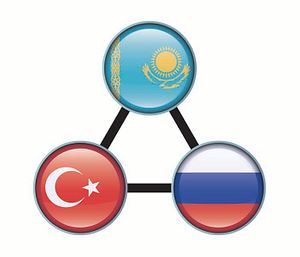The quick thawing of icy relations between Russia and Turkey came with thanks to both Kazakhstan and Azerbaijan. Turkish Prime Minister Binali Yildirim told Turkish media last week, “The ice in relations of the two countries has melt[ed], thanks to the contribution of our fraternal countries — Kazakhstan and Azerbaijan — who exerted every effort to normalize the relations between Turkey and Russia. We express our gratitude to these countries.”
The sentiment was echoed by the Turkish foreign minister, Mevlut Cavusoglu, from Sochi where he met with Russian Foreign Minister Sergey Lavrov on the sidelines of the Black Sea Economic Cooperation Organization foreign ministers meeting. Cavusoglu reportedly noted the important role both Baku and Astana played in bringing about the normalization process now underway.
Kazakhstan–which was recently elected to two-year term as a non-permanent member of the UN Security Council–is seeing the fruit of its diplomatic endeavors. In its efforts to craft Kazakhstan’s international image as both a major economic power and diplomatic stalwart, Astana has tried to mediate–or at the very least bridge gaps–in conflicts from Ukraine to Syria. But the break last November between Russia and Turkey was particularly difficult to stomach for Kazakhstan.
“The Kazakh president comes across as disappointed with how quickly relations between Turkey and Russia have deteriorated,” I noted in December. President Nursultan Nazarbayev had taken some time out of his annual state of the nation speech to lament the breakdown:
I am someone who has worked for many years in order to bring Russia and Turkey closer together, to make their relationship friendly. Since the time of Prime Minister [of Turkey Süleyman] Demirel, starting with President [of Russia Boris] Yeltsin. And all of this that was built over many years could now come to nothing… However difficult it is, there needs to be a way to work together to create a commission to identify those responsible, to punish them, to admit any mistakes and to restore the relationship. This is what I am urging our friends in both Russia and Turkey to do.
For a host of historical, cultural, economic, and political reasons Kazakhstan has strong ties to both Russia and Turkey. Their split put Astana in an awkward position but also presented an opportunity for Kazakhstan to flex its diplomatic muscle. While the crisis between Russia and Ukraine persists and hosting Syrian opposition groups for summits has not led to cohesion among them, Kazakhstan can point to the rapprochement between Russia and Turkey as a success. And Astana was perhaps–along with Azerbaijan–uniquely suited to bringing Russia and Turkey back together.

































